Comprehensive Guide to Garden Maintenance in Walthamstow
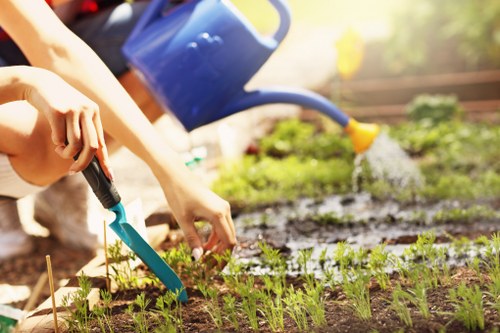
Introduction to Garden Maintenance
Maintaining a beautiful garden in Walthamstow requires dedication, knowledge, and the right strategies. Whether you’re a seasoned gardener or a novice, understanding the fundamentals of garden maintenance can transform your outdoor space into a lush, thriving oasis.
Walthamstow, with its unique climate and soil conditions, offers both challenges and opportunities for gardeners. Proper maintenance ensures that your plants not only survive but flourish throughout the seasons.
In this article, we will explore essential garden maintenance tips tailored specifically for Walthamstow residents. From soil preparation to pest control, we’ve got you covered.
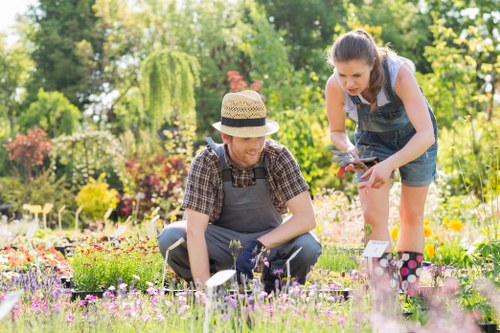
Understanding the Climate of Walthamstow
Walthamstow experiences a temperate climate with moderate rainfall and mild temperatures. Understanding these climatic conditions is crucial for effective garden maintenance.
Key Climate Factors:
- Temperature: Average temperatures range from 2°C in winter to 23°C in summer.
- Rainfall: Walthamstow receives approximately 600mm of rainfall annually, evenly distributed throughout the year.
- Sunlight: Most gardens in Walthamstow enjoy ample sunlight, especially during the spring and summer months.
By aligning your gardening practices with these climate factors, you can enhance plant growth and reduce maintenance efforts.
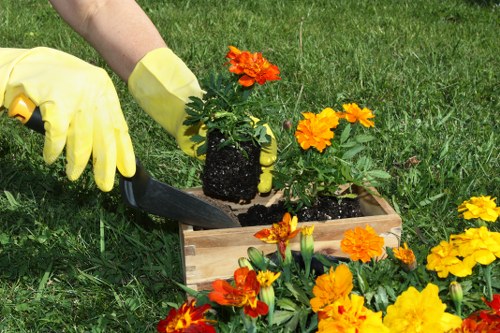
Soil Preparation and Improvement
Healthy soil is the foundation of a thriving garden. In Walthamstow, soil types can vary, so it’s essential to test and amend your soil accordingly.
Soil Testing
Before embarking on any garden project, conduct a soil test to determine pH levels and nutrient content. This will help you identify any deficiencies or imbalances.
Amending the Soil
Based on your soil test results, you may need to:
- Add Compost: Enhances soil structure and fertility.
- Incorporate Mulch: Helps retain moisture and suppress weeds.
- Adjust pH Levels: Lime can be added to raise pH, while sulfur can lower it.
Regularly improving your soil ensures a healthy environment for your plants.
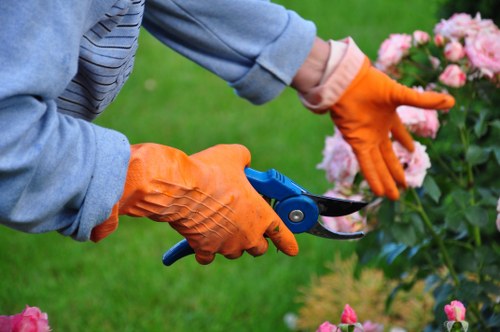
Plant Selection and Care
Choosing the right plants is vital for garden maintenance. Opt for species that thrive in Walthamstow’s climate and soil conditions.
Perennials vs. Annuals
Perennials: These plants come back year after year, reducing the need for replanting.
Annuals: They provide vibrant seasonal color but require more maintenance to replace each year.
Native Plants
Incorporating native plants can enhance biodiversity and reduce maintenance since they are well-adapted to the local environment.
Popular Choices in Walthamstow:
- Lavender
- Hostas
- Geraniums
- Roses
Selecting the right plants ensures a resilient and beautiful garden.
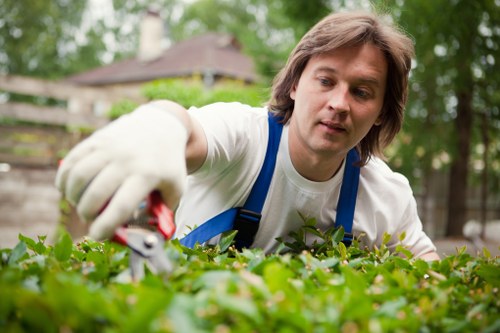
Regular Maintenance Tasks
Consistent maintenance is key to a thriving garden. Here are some routine tasks to keep your garden in top shape:
Pruning and Trimming
Regular pruning encourages healthy growth and removes diseased or dead branches.
- Prune flowering shrubs after blooming.
- Trim hedges during the growing season.
Weeding
Weeds compete with your plants for nutrients and water. Regular weeding helps maintain garden health.
Mulching
Applying mulch not only suppresses weeds but also retains soil moisture and improves soil quality.
Action Steps:
- Remove existing weeds manually or using appropriate tools.
- Apply a 2-3 inch layer of mulch around plants.
- Replenish mulch as needed throughout the year.

Seasonal Gardening Tips
Adapting your gardening practices to the seasons can significantly impact plant health and garden aesthetics.
Spring
Spring is ideal for planting new flowers and vegetables. It’s also a good time for soil preparation and fertilization.
Summer
Focus on regular watering, weeding, and pest control during the hot summer months.
Autumn
Autumn is perfect for planting bulbs, dividing perennials, and preparing your garden for the winter.
Winter
Protect plants from frost, prune dormant trees, and plan for the upcoming gardening season.
By following seasonal tips, you can ensure year-round garden vitality.

Pest and Disease Management
Effective pest and disease control is essential for maintaining a healthy garden.
Identifying Common Pests
In Walthamstow, common garden pests include aphids, slugs, and caterpillars.
- Aphids: Small insects that suck sap from plants.
- Slugs: Mollusks that cause significant damage to foliage.
- Caterpillars: Larvae that feed on a variety of plants.
Natural Pest Control Methods
Consider eco-friendly approaches to manage pests:
- Introduce beneficial insects like ladybugs.
- Use neem oil or insecticidal soaps.
- Implement barriers and traps.
Dealing with Diseases
Prevent plant diseases by ensuring proper ventilation, watering at the base, and removing infected plants promptly.
Proactive Measures:
- Rotate crops annually to prevent soil-borne diseases.
- Choose disease-resistant plant varieties.
- Maintain garden hygiene by cleaning tools and removing debris.

Irrigation and Water Management
Proper watering is critical for garden maintenance. Over or under-watering can stress plants and lead to poor growth.
Watering Techniques
- Drip Irrigation: Delivers water directly to plant roots, reducing waste.
- Soaker Hoses: Ideal for evenly watering garden beds.
- Manual Watering: Suitable for small gardens and specific plant needs.
Rainwater Harvesting
Collecting rainwater is an eco-friendly way to irrigate your garden. It reduces reliance on mains water and provides plants with natural, chemical-free water.
Water Conservation Tips
Implement these strategies to optimize water usage:
- Use mulch to retain soil moisture.
- Water plants during early morning or late evening to minimize evaporation.
- Group plants with similar water needs together.

Tool Selection and Maintenance
The right tools make garden maintenance more efficient and enjoyable.
Essential Gardening Tools
- Pruning shears
- Garden fork
- Spade and shovel
- Hose and watering can
- Gloves and protective gear
Tool Care
Maintain your tools to ensure longevity and effectiveness:
- Clean tools after each use to prevent rust and buildup.
- Sharpen blades regularly for optimal performance.
- Store tools in a dry, sheltered place.
Investing in Quality
High-quality tools may have a higher upfront cost but offer better durability and ease of use, ultimately saving time and effort in garden maintenance.

Creating Sustainable Gardens
Sustainability in gardening not only benefits the environment but also enhances the beauty and functionality of your garden.
Organic Gardening Practices
Embrace organic methods to promote a healthy, chemical-free garden:
- Use organic fertilizers like compost and manure.
- Employ natural pest repellents.
- Practice crop rotation and companion planting.
Composting
Recycling garden waste through composting enriches the soil and reduces landfill contributions.
Water Conservation Techniques
Implementing water-saving strategies ensures your garden remains lush without excessive water use.
Benefits of Sustainable Gardening:
- Promotes biodiversity.
- Reduces environmental impact.
- Enhances soil health.

Landscape Design Tips
A well-designed garden not only looks appealing but also functions efficiently.
Planning Your Garden Layout
Consider the following when designing your garden:
- Sunlight exposure
- Soil type and drainage
- Plant spacing and growth habits
- Pathways and access points
Incorporating Hardscaping
Elements like patios, arches, and fences add structure and visual interest to your garden.
Choosing the Right Plants
Select plants that complement each other in terms of color, texture, and height to create a harmonious landscape.
Design Principles:
- Balance and symmetry
- Focal points
- Layering and depth
- Texture variation

Lighting and Garden Features
Enhance your garden’s ambiance with thoughtful lighting and features.
Garden Lighting Options
- Solar-powered lights for eco-friendly illumination.
- Pathway lights for safety and aesthetics.
- Spotlights to highlight key garden elements.
Water Features
Incorporating fountains, ponds, or waterfalls adds a soothing element to your garden environment.
Outdoor Furniture
Comfortable seating areas encourage relaxation and enjoyment of your garden space.
By integrating lighting and features, you create a garden that’s enjoyable both day and night.

Eco-Friendly Gardening Practices
Adopting eco-friendly practices ensures your garden contributes positively to the environment.
Reducing Chemical Use
Minimize reliance on chemical fertilizers and pesticides by utilizing natural alternatives.
- Use compost as a natural fertilizer.
- Implement biological pest control.
- Adopt integrated pest management (IPM) strategies.
Promoting Biodiversity
Diverse plant species attract beneficial insects and wildlife, enhancing the ecological balance of your garden.
Recycling and Reusing
Repurpose materials for garden projects, reducing waste and promoting sustainability.
Eco-Friendly Tips:
- Plant native species to support local ecosystems.
- Use rain barrels to collect and reuse rainwater.
- Incorporate vegetable gardens to grow your own produce.

Dealing with Common Garden Challenges
Every garden faces challenges, but with the right approach, you can overcome them effectively.
Managing Weeds
Weeds compete with your plants for resources. Regular removal and preventive measures are essential.
Soil Erosion
Prevent soil erosion by planting ground covers and using terraces or retaining walls in sloped areas.
Pest Infestations
Identify and address pest issues early to prevent widespread damage to your garden.
Solutions:
- Implement mulch to suppress weed growth.
- Use barriers and natural predators to control pests.
- Regularly inspect plants for signs of stress or disease.

Hiring Professional Garden Maintenance Services
Sometimes, professional assistance is the best way to ensure your garden remains pristine.
Benefits of Professional Services
- Expert knowledge and experience.
- Access to specialized tools and equipment.
- Time-saving and convenience.
Choosing the Right Service
When selecting a garden maintenance service in Walthamstow, consider the following:
- Reputation and reviews.
- Range of services offered.
- Pricing and value for money.
- Certifications and qualifications.
When to Hire Professionals
Consider hiring professionals for tasks such as:
- Major landscaping projects.
- Disease and pest management.
- Seasonal clean-ups.
Investing in professional services can enhance the beauty and health of your garden while saving you time and effort.

Conclusion
Effective garden maintenance in Walthamstow involves a combination of understanding the local climate, selecting appropriate plants, and implementing sustainable practices. By following the tips outlined in this guide, you can create and maintain a beautiful, thriving garden that enhances your home and provides a peaceful retreat.
Remember, a well-maintained garden not only boosts your property’s curb appeal but also contributes to your overall well-being.
Ready to transform your garden? Contact us today to book your garden maintenance service and enjoy a lush, vibrant outdoor space all year round!